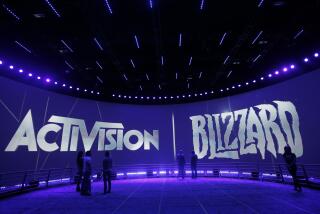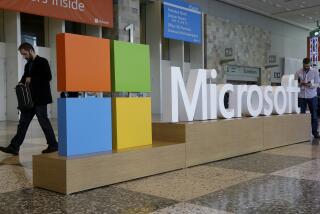User- Friendly Truce
- Share via
The prospect of a quick settlement in lieu of a drawn-out legal battle between Microsoft and antitrust enforcers is good news for the computer industry--which could have suffered from any prolonged market disruptions--and for consumers, who could begin reaping the benefits of enhanced competition sooner.
The Justice Department and attorneys general from 20 states and the District of Columbia said they welcomed Microsoft’s offer to delay initial shipments of its Windows 98 personal computer operating system and come to the bargaining table. That move stalled a widely anticipated antitrust lawsuit against the world’s largest software company, which stands accused of leveraging its Windows monopoly to snuff out competition and control access to the Internet.
Of course, the true impact will depend on the specific terms of the settlement--if one is ultimately reached--and the speed with which it is negotiated.
Representatives from Microsoft, the Justice Department and attorneys general from New York, Wisconsin and Texas are scheduled to begin talks today in Washington.
After a months-long war of words--including warnings from Microsoft Chief Executive Bill Gates that delaying the release of Windows 98 would threaten the national economy--many welcomed Microsoft’s willingness to consider a settlement.
The new developments offer “a moment of encouragement. . . . Some optimism has erupted that we may be able to negotiate successfully with Microsoft,” California Atty. Gen. Dan Lungren said.
For Microsoft, a quick settlement would minimize financial losses that might occur if the release of Windows 98 were substantially delayed, industry observers said. Bill Peterson, an analyst at Framingham, Mass.-based International Data Corp., said a two-week delay in shipping Windows 98 might cost Microsoft more than $100 million in upgrades but that the company would recover that money when the product shipped.
But regulators’ concerns extend beyond Windows 98 to Microsoft’s general business practices. How a settlement deals with Microsoft’s use of its monopoly power could have a profound long-term impact on the company.
So far, Microsoft has agreed to loosen restrictions it places on PC manufacturers that install Windows on their machines. Further concessions could result in a minor shift of power from Microsoft to the computer makers.
For example, if the manufacturers could control the opening screen and the desktop display, whose look is currently dictated by Microsoft, they could boost their brand images and sell prime real estate on the screens.
If talks drag on, any adverse impact would probably be felt first by computer retailers, who would see millions of advertising dollars go to waste. Also threatened would be makers of computer peripherals, such as printers, scanners and game-control devices designed to work with Windows 98.
Computer manufacturers said a delay in the release of Windows 98 would cause only a minor disruption of PC sales momentum.
“Windows 98 is a potential contributor to industry demand,” said T.R. Reid, a spokesman for Dell Computer in Austin, Texas. “But it’s not a fundamental driver. It’s not as if people are delaying purchases.”
Dell, Netscape Communications, Compaq Computer, Hewlett-Packard and others also said they won’t adjust their product plans until negotiations are concluded.
Representatives of state attorneys general emphasized that their goal is not to punish Microsoft or the companies that depend on its software.
Tom Landess, a spokesman for the South Carolina attorney general’s office, said a settlement would not only provide quick relief, it would also provide a surer bet for consumer protection.
“For consumers, it would resolve future problems immediately,” he said. “And who knows what the outcome of litigation would be?”
*
Times staff writers Greg Miller in San Francisco and Ken Ellingwood in San Diego contributed to this report.
(BEGIN TEXT OF INFOBOX / INFOGRAPHIC)
A systems analysis
The Justice Department and 20 state attorneys general have accused Microsoft of using its status to crimp competition--especially in the Internet browser market. To head off antitrust action, Microsoft agreed to delay shipping its new Windows 98 software, which integrates the Windows 95 operating system with a Web browser. Microsoft’s Windows operating system is used on more than 90% of the world’s personal computers. In recent years, the Redmond, Wash.-based company has stepped into other areas, including the Internet, cable and television.
Microsoft has quickly gained a bigger share of the browser market . . .
1995
Netscape: 80.1%
Microsoft: 2.9%
Others: 17.0%
*
1997*
Netscape: 57.6%
Microsoft: 39.4%
Others: 3.0%
*Third quarter
. . . While maintaining a huge lead in operating systems . . .
Market share in operating systems, 1996 and projected 1998:
Windows 95, 98
Projected 1998: 73.9%
1996: 53.0
*
Windows NT
Projected 1998: 14.4%
1996: 3.1
*
Mac OS
Projected 1998: 5.3%
1996: 5.5
*
OS/2
Projected 1998: 2.0%
1996: 2.8
*
UNIX
Projected 1998: 1.5%
1996: 1.7
*
Windows 3.1 (with DOS)
Projected 1998: 1.1%
1996: 28.3
*
DOS (without Windows)
Projected 1998: 0.87%
1996: 3.4
*
NetWare (server licenses)
Projected 1998: 0.74%
1996: 0.78
*
Proprietary and others
Projected 1998: 0.41%
1996: 0.80
. . . And is setting its sights on dominating other markets.
Other markets Microsoft is trying to set the standard in:
Travel: through its online travel agency Expedia.
Cable: through MSNBC, a cable channel and online service bankrolled by NBC and Microsoft.
Multimedia online: through acquisitions of 10% of RealNetworks, manufacturer of RealAudio and RealVideo real-time streaming technology, and its competitor, software maker VXtreme, and Web TV.
The convergence of TV and the PC: through a $1-billion investment in cable TV operator Comcast and a deal with TCI and Sun Microsystems to provide software for cable TV set-top boxes.
Note: Numbers may not add up to 100% because of rounding.
Sources: Dataquest, Times reports
Researched by JENNIFER OLDHAM / Los Angeles Times
More Coverage
* Microsoft unexpectedly signaled its willingness to negotiate with officials. A1
* What Windows 98 offers, and what a delay in its release would mean for users. D6






